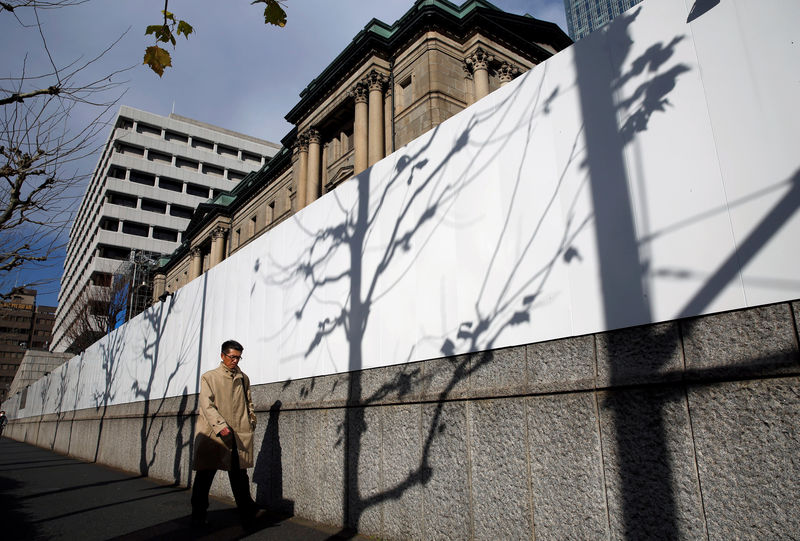 © Reuters. Man walks past the Bank of Japan building in Tokyo
© Reuters. Man walks past the Bank of Japan building in TokyoBy Leika Kihara
TOKYO (Reuters) – Japan’s central bank is set to keep monetary settings unchanged on Tuesday and offer a cautiously optimistic view on the inflation outlook, nodding to expectations that a strengthening recovery and a tightening job market may prompt firms to lift wages.
But Bank of Japan Governor Haruhiko Kuroda will seek to dispel market speculation of an early withdrawal of stimulus by reminding investors at his post-meeting briefing that inflation remains distant from his 2 percent target, analysts say.
The yen’s recent gains, if they persist, may also keep BOJ officials from openly debating a future exit from crisis-mode policies, as a weak currency and a rise in exports have been among the key drivers of Japan’s recovery.
“I don’t think the BOJ is worried about current dollar/yen levels. Its key concern is the risk of triggering a big market reaction when it starts to signal a hike in its yield targets,” said Hiroshi Ugai, chief Japan economist at JPMorgan (NYSE:) Securities.
“The BOJ probably wants to spend more time looking at wage and price developments, so I doubt Kuroda will send any signals on the future policy path this time,” he said.
At the two-day meeting ending on Tuesday, the BOJ is seen maintaining a pledge to guide short-term interest rates at minus 0.1 percent and 10-year bond yields around zero percent.
It will also likely keep intact a loose pledge to buy government bonds so its holdings increase roughly at an annual pace of 80 trillion yen ($722 billion).
NO COMPLACENCY
Brightening global growth prospects are offering fresh communication challenges for policymakers. The BOJ, the Federal Reserve and the European Central Bank are all grappling with how to exit extraordinary policy steps, without scaring investors accustomed to years of massive cheap money.
Japan got a taste of the challenge when a cut in the BOJ’s bond buying pushed up global yields, and Kuroda’s positive remarks on the economy drove the yen to a four-month high.
With exports booming from robust global demand, the BOJ is seen slightly raising its growth forecast for the fiscal year beginning in April from a projection of 1.4 percent made three months ago, according to sources familiar with its thinking.
In the quarterly review, the central bank will roughly maintain its price forecasts for coming years and stick to its view that inflation will hit 2 percent by March 2020, they say.
Sources say the nine-member board may also debate offering a slightly brighter view on inflation expectations than the existing assessment, which currently describes expectations as being “on a weak note.”
Japan’s economy expanded for the seventh straight quarter in July-September and business confidence hit a 11-year high on robust exports and capital expenditure.
Core consumer prices rose for the 11th straight month in November and the percentage of households expecting inflation to accelerate hit a nearly two-year high in January, adding to signs Japan may be emerging from two decades of deflation.
But BOJ policymakers are hardly complacent and warn that an index of consumer inflation that strips away the effect of fresh food and energy – still at 0.3 percent – must accelerate more before any debate on withdrawing stimulus could begin.
Fusion Media or anyone involved with Fusion Media will not accept any liability for loss or damage as a result of reliance on the information including data, quotes, charts and buy/sell signals contained within this website. Please be fully informed regarding the risks and costs associated with trading the financial markets, it is one of the riskiest investment forms possible.
Source: Investing.com



























